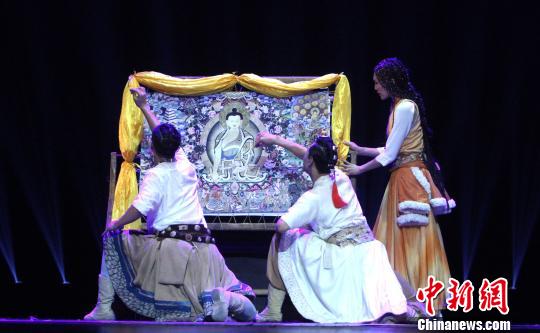Villagers in Tibet benefit from culture industry
It is middle of winter in Tsechokling Village on the southern bank of the Lhasa River, and the air is chilly. Villager Tsedondrup fed d her family's 60 yaks with some extra corn they have grown themselves.
"I used to only feed them grass, and I felt that taking care of a herd of yaks was really exhausting," Tsedondrup said. "Right now these yaks make the most money for my family, so I have to make sure they are fed well and get fatter."
Since 2013, Tsedondrup has brought the yaks to the nearby Rin Bottle Mountain every night, where they take part in the Princess Wencheng live-action drama performance. At the end of the 2017 performance season, the yaks' six months of performances earned Tsedondrup's family 130,000 yuan (20,508 US Dollars).
Tsechokling Village lies across the river facing the Potala Palace. According to legend, a thousand years ago, Princess Wencheng traveled into Tibet through here. In August 2013, the song and dance drama that relates this story premiered here in Tsechokling Village at the foot of Rin Bottle Mountain. That year, nearly 1/3 of the households in the village lived in poverty. In 2017, the last 19 impoverished households with 58 people in the village were lifted out of poverty.
Villager Phurbu Tashi and his wife are extras performing in the Princess Wencheng drama. Each month of the performance season, they earn between 3,000 to 4,000 yuan (473.26 US Dollars to 631.01 US Dollars)), and during the winter off-season they received a 600 yuan (94.65 US Dollars) monthly living allowance. Phurbu Tashi has bought himself a new car and built a new house, and he and his wife are planning to open a clothing store.
"Since the Princess Wencheng drama premiered, most villagers have been acting in the cast or work as cleaners or security at the theater," Paldron said. "This kind of work right near home makes it convenient for taking care of our elderly and young children, and people can find some part-time work during the day."
For villagers in Tsechokling Village, performing in Princess Wencheng lets them continue a tradition of cultural and artistic passion that has been passed down from generation to generation.
The village is known for its Tibetan opera, a national-level intangible cultural heritage. "Villagers have a traditionally enthusiastic love for theatrical performances, and now they can earn money for singing and dancing," Phurbu Tashi said. On stage, he not only can see his own familiar Tibetan opera masks, he has learned four traditional Tibetan dances such as a-ga, earning him the opportunity to perform part-time with a folk art troupe.
According to the operator of Princess Wencheng, out of the performance's more than 800 cast members, 95 percent are farmers and nomads from all over Tibet. The performance includes a large number of Tibetan "intangible" cultural heritage elements, which basically originate from agriculture and nomadic regions, and farmers and nomads are the most direct cultural inheritors of them.
Your Comment
Name E-mailRelated News
-
;
-
-

-
Dance drama themed on Thangka painting performed in North China
A large-scale original ethnic dance drama themed on Thangka painting was staged in Tianjin in North China in the evening of Jan. 13.
-
-
-

-
Qinghai's Original dance drama Thangka staged in Tianjin
Thangka, an original ethnic dance drama of Qinghai Province, staged in Tianjin, Jan. 13, receiving overwhelming response from audience with its unique ethnic features and superb artistic skills.
-
Based in Lhasa, Tibet Vista is a Tibet travel agency that specialized in Tibet permit, and Tibet tours for both private and group travelers at a local price!
•4 Days Lhasa City Group Tour from USD 460 •8 Days Everest Base Camp Group Tour from USD 850 •15 Days Mt.Kailash Group Tour from USD 1780 •2016 Tibet Train Tours from Beijing, Shanghai, Chengdu, Xining,etc










